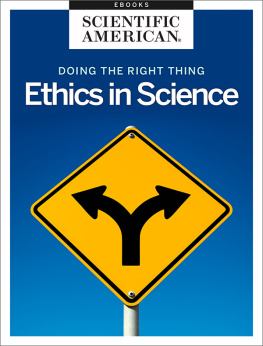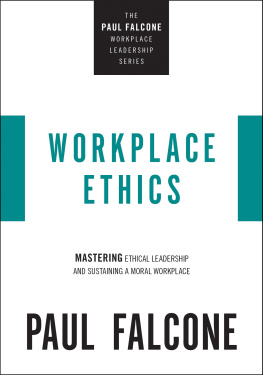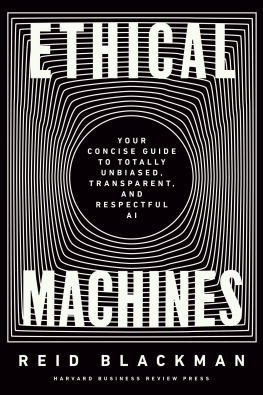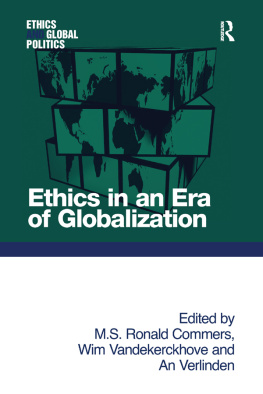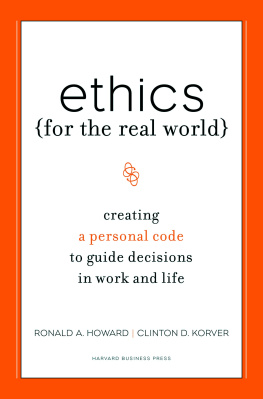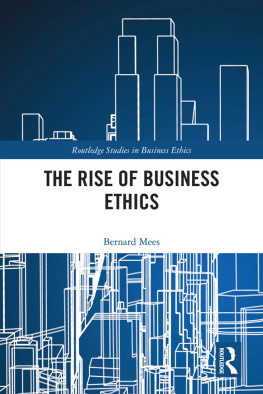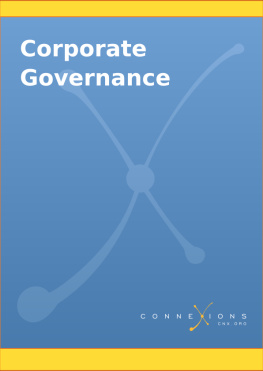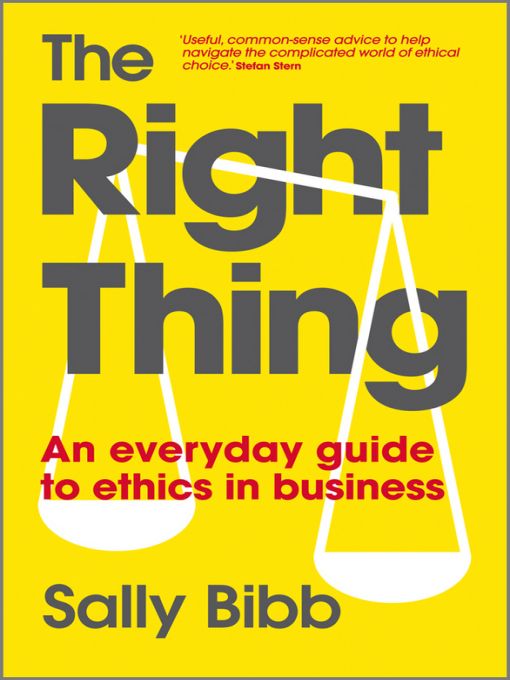Table of Contents
Further praise forThe Right Thing
A useful roadmap for developing a more ethical culture, The Right Thing is a must-read for anyone from the business school to the board room.
David Cox, SVP and CFO, Economist Group, Americas
I strongly recommend this book to anyone who thinks ethics matters in business. And for those who dont yet think so, beware; the evidence is growing that people prefer to work for and do business with ethical companies.
Paul Moore, HBOS Whistleblower and Senior Partner at Moore, Carter & Associates
In these times understanding ethics has never been more important. The Right Thing explores the practical realities of ethical behavior; its driving forces and implications.
John Harris, former CEO, Calor
A hearts and minds, root and branch perspective on ethical business.
Katie Alcott, Founder, Frank Water
If good leadership is the life blood of a successful organization, then great ethics is the heart beat. The Right Thing is a simple to read, approachable framework for the time poor, intelligent business leader to engage with the critical, ethical and moral questions and challenges of business.
Daniel Snell, Founder, Arrival Education
If long-term success is your business goal, you cant afford not to do the right thing. Sally Bibb provides a fresh look at business ethics and what you can do to instil them in your organizations culture.
Daniel H. Pink, author ofA Whole New MindandDrive
ACKNOWLEDGEMENTS
Book writing is never an individual quest. Writing this one certainly wasnt and there are a good number of people who contributed either directly or indirectly and who I would like to thank.
First and foremost are those from whom, over many years, the inspiration came to write about ethics. They are the people who have played a particularly strong part in fuelling my interest in and thinking on the subject of ethics: my parents, my grand-father, my friend Jon Cassell, my friend and mentor the late Gerard Fairtlough, my occasional mentor and associate John Harris, my former boss at The Economist Group David Laird, former colleague at BT Marine Rob Struzyna and, even though I never knew her personally, the inspiration of the late Mo Mowlam.
There are a number of people who have helped me with my research. Jan Abbey, Pam Hurley and everyone who gave me feedback on the development of the survey questions helped me to make it a great survey that has elicited useful and fascinating insight. Karen Otazo, Jane Zirlis, Liz Luya and Paul Barlow helped me to make sure that it reached the right people. And of course I am also very grateful to everyone around the world who completed the survey and who engaged in online and face-to-face conversations with me on the subject. My strengths do not run to data analysis and data presentation. Without Simon Walker and Jonathan Gulliver I would have lots of raw data and little useful insight - thank you, guys.
To a large extent it is true that the author is a books best marketer. But in reality it takes a team of people. Nick Mannion, Julia Bezzant, the designers and my digital marketing guru Jim Banting have all been fantastic and cheered up many a tough days writing with their emails containing cover drafts, new website designs and other exciting goodies.
My friend, writing mentor and fellow author Andy Maslen has as usual been a gem. In his no-holds-barred way he has given me invaluable feedback and sound advice on the book proposal, manuscript, title and cover. Thanks, Andy - its always educational and fun!
I am grateful to Ellen Hallsworth, my editor at Wiley, who gave me the opportunity to write this book in the first place. Thank you, Ellen, for all of your support, patience and responsiveness.
When I am juggling writing and work I am very conscious that I dont spend enough time with my precious family and friends. For their encouragement, interest and understanding I give special thanks to my mum and to my friends near and far. And to the wonderful Fi, thanks for all of your texts, your unfailing interest, wisdom and humour.
And last, but not least, thank you to my friend and partner Yannis for encouraging me to write the book and to keep going with it, for reviewing many early drafts and for general all-round unerring support andtolerance.
ABOUT THE AUTHOR
Sally Bibb is a business consultant, writer and speaker. She is co-founder of talentsmoothie, an organization development consultancy. She is also the founder of Engaging Minds, an engagement and communications consultancy. Sallys background is in international organizational change. Before setting up her businesses she was a director at The Economist Group.
Sally is the author of several successful business books, including A Question of Trust (with Jeremy Kourdi, 2007), Management F/Laws (with Russ Ackoff and Herb Addison, 2006), The Stone Age Company (2005), Trust Matters (2004 - winner of an MCA award) and The Rookies Guide to Generation Y (2009).
You can read more about Sally and workplace ethics at www.sallybibb.com.
INTRODUCTION
Ethics and trust are fundamental to excellent leadership and great organizations but they are often overlooked. They are invariably only treated as a priority when something goes wrong. Unethical practices in the workplace can cause irreparable damage to individuals and to the organization. Reputation, morale, productivity, loyalty, quality of work, the ability to attract the right employees and customers and ultimately profitability are all at risk in an organization that does not operate to high ethical standards. Despite these clear risks there is still not enough urgency placed on the subject. Compared to, say, the attention that executives give to the performance metrics of their organization, ethics is definitely a poor relation.
But what do we mean by ethics? It is a term that is used without us necessarily being very precise about what we are talking about. The dictionary definition of ethics is the rules of moral conduct governing an individual or group. I have also asked some managers for their definition of ethics. Here are some of the answers that I have been given:
Moralwaysof doingthings.
Decisions that are based on considering others values and what is good for them.
At a minimum, its following the law.
Doing the right thing for the maximum number of people.
The right thing to do for the most people concerned.
It is difficult to come up with a practical and all-encompassing definition of ethics but for the purposes of this book I will use the following:
Social - Ethics is following social and moral obligations to a broader group of people. This means more than following the law. It means not acting in certain ways, for example lying, cheating, damaging anothers property. It also means acting in certain ways, for example being honest, compassionate, listening to others viewpoints.
Personal - In order to be ethical a person needs to be aware of his or her own moral code and standards. A definition of ethics therefore has to include understanding what, as an individual,you believeto berightorwrong.



